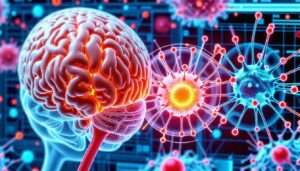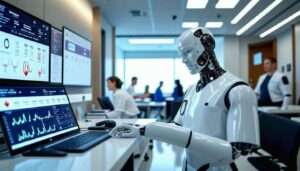Embracing the power of artificial intelligence in the field of medicine has unveiled a new era of disease diagnosis, significantly impacting the accuracy and speed of identifying life-threatening conditions. The utilization of AI technologies in healthcare has paved the way for advanced algorithms and machine learning models to analyze medical data with unprecedented efficiency, enabling early detection and precise diagnosis of diseases. By harnessing the capabilities of AI, healthcare professionals are now equipped to identify critical illnesses such as cancer, heart disease, and neurological disorders with greater accuracy, ultimately saving lives and improving patient outcomes. In this blog post, you will understand how AI is transforming disease diagnosis and learn about the potential benefits and risks associated with this groundbreaking technology.
Key Takeaways:
- Early detection: AI has the potential to detect diseases at an earlier stage, increasing the chance of successful treatment and improving patient outcomes.
- Improved accuracy: AI algorithms are capable of analyzing vast amounts of data with high accuracy, reducing the risk of human error in disease diagnosis.
- Personalized treatment plans: AI can analyze individual patient data to create personalized treatment plans, leading to more tailored and effective interventions.
- Efficient healthcare system: By streamlining the diagnostic process, AI can help alleviate the burden on healthcare systems, reducing wait times and improving access to care.
- Ongoing advancements: Continued development of AI technology is expected to lead to further improvements in disease diagnosis, potentially revolutionizing the field of medicine.
AI Technologies in Diagnosis
Obviously, the role of artificial intelligence (AI) in revolutionizing disease diagnosis cannot be overlooked. AI technologies are playing a crucial role in transforming the way disease diagnosis is conducted, providing more accurate and efficient results. For further reading, you can refer to Revolutionizing healthcare: the role of artificial intelligence in …
Machine Learning Algorithms
Machine learning algorithms are a key component of AI technologies in disease diagnosis. These algorithms have the ability to analyze vast amounts of data and identify patterns that may not be evident to the human eye. By leveraging these algorithms, you can enhance the accuracy and speed of disease diagnosis. Machine learning algorithms have the potential to greatly reduce the risk of misdiagnosis and provide more personalized treatment plans tailored to your specific health needs.
Deep Learning and Neural Networks
Another essential aspect of AI technologies in disease diagnosis is deep learning and neural networks. These technologies have the capability to process complex data and extract meaningful insights. They can be used to detect abnormalities in medical imaging, such as X-rays and MRI scans, with remarkable accuracy and efficiency. By incorporating deep learning and neural networks into disease diagnosis, you can receive more reliable and timely results, leading to better health outcomes for you.
Applications of AI in Disease Diagnosis
Any individual can benefit from the applications of AI in disease diagnosis. Through the use of advanced algorithms and machine learning, AI is revolutionizing the way diseases are diagnosed and treated. Let’s take a look at how AI is being used in various areas of disease detection and diagnosis.
Cancer Detection
When it comes to cancer detection, AI has proven to be a game-changer. By analyzing medical imaging, such as MRI and CT scans, AI algorithms can identify early-stage tumors and lesions that may be difficult for human radiologists to detect. This not only improves the accuracy of cancer diagnosis but also allows for timely intervention and treatment, significantly improving the prognosis for cancer patients.
Cardiovascular Disease Prediction
AI has also been instrumental in predicting the risk of cardiovascular diseases such as heart attacks and strokes. By analyzing a wide range of patient data, including medical history, lifestyle factors, and genetic predispositions, AI algorithms can identify individuals at high risk of developing cardiovascular diseases. This allows for personalized preventive measures and early interventions, potentially saving lives and reducing the burden on healthcare systems.
Neurodegenerative Disorders Identification
Another area where AI is making significant strides is in the identification of neurodegenerative disorders such as Alzheimer’s and Parkinson’s disease. Through the analysis of brain imaging and biomarkers, AI algorithms can detect subtle changes that may indicate the presence of these disorders at an early stage. Early detection is key in these conditions, as it allows for timely interventions and management strategies that can improve the quality of life for affected individuals.
Rare Diseases and Genetic Disorder Analysis
AI is also being used to analyze genetic data and assist in the diagnosis of rare diseases and genetic disorders. By comparing a patient’s genetic information with vast databases of genomic data, AI algorithms can identify rare genetic mutations that may be the cause of undiagnosed conditions. This has the potential to provide answers to individuals and families who have been struggling with undiagnosed illnesses for years, leading to more targeted treatment and management approaches.
Challenges and Ethical Considerations
To understand the impact of AI in disease diagnosis, it is important to consider the challenges and ethical implications that come with it. If you are interested, you can read more about how AI is revolutionizing medical diagnosis in the 21st century here.
Data Privacy and Security
When it comes to using AI for disease diagnosis, one of the primary concerns is data privacy and security. Your medical data is highly sensitive, and ensuring that it is protected from unauthorized access and breaches is crucial. With AI systems accessing and analyzing large volumes of personal health information, ensuring the security and privacy of this data becomes paramount. Strong encryption, anonymization techniques, and robust access controls are essential to safeguarding your medical data.
Bias and Fairness in AI Diagnostics
Another key consideration in the use of AI for disease diagnosis is the potential for bias and fairness in the diagnostic process. AI algorithms are only as good as the data they are trained on, and if there are inherent biases in the training data, it can lead to skewed results. This can have serious implications for certain demographic groups, potentially leading to misdiagnosis or underdiagnosis. It is important to continuously assess and address biases in AI diagnostic systems to ensure equitable and accurate healthcare outcomes for all individuals.
Regulatory Hurdles
From a regulatory perspective, the integration of AI in disease diagnosis presents its own set of challenges. Ensuring that AI diagnostic systems meet stringent regulatory standards and guidelines is crucial in order to guarantee the safety and efficacy of these technologies. Furthermore, the evolving nature of AI technology means that regulatory frameworks need to keep pace with rapid advancements, posing a significant hurdle in ensuring that these systems are appropriately regulated and monitored. Despite these hurdles, the potential benefits of AI in disease diagnosis make it imperative to navigate and overcome these regulatory challenges for the greater good.
The Future of AI in Medicine
Now, you may be wondering what the future holds for artificial intelligence in medicine. Well, the exciting news is that AI is set to play an even bigger role in revolutionizing healthcare. Artificial intelligence is helping revolutionize healthcare as it becomes increasingly integrated into various medical applications and processes.
Integrating AI with Personalized Medicine
You’ll be pleased to know that AI is paving the way for personalized medicine, enabling tailored treatments based on your unique genetic makeup, lifestyle, and environmental factors. By processing large amounts of data, AI can help analyze complex patterns and make predictions to assist healthcare professionals in making more accurate diagnoses and treatment decisions for each individual. This is a significant advancement that will greatly enhance the way you receive medical care, leading to more effective and personalized treatments.
The Role of Big Data and EHRs
Another crucial aspect of AI in medicine is its utilization of big data and electronic health records (EHRs). AI has the capability to process and analyze massive volumes of medical data from various sources, such as patient records, diagnostic images, and clinical notes. By doing so, it can identify patterns and correlations that may not be immediately apparent to human healthcare providers. This enables more accurate and timely diagnosis of diseases, potentially saving lives and improving outcomes. With the help of AI, healthcare professionals can gain valuable insights from a wealth of data, leading to more effective decision-making and improved patient care.
Conclusion: How AI is Revolutionizing Disease Diagnosis
Upon reflecting on the advancements in artificial intelligence and its impact on disease diagnosis, it is evident that AI has revolutionized the way healthcare professionals approach and treat various diseases. The integration of AI technologies has allowed for more accurate and efficient diagnosis, ultimately improving patient outcomes and reducing healthcare costs. By leveraging big data and advanced algorithms, AI can analyze a patient’s symptoms, medical history, and diagnostic tests to provide precise and personalized diagnoses. As a result, you can expect to see a significant shift towards AI-driven healthcare in the coming years, as it continues to transform the landscape of medical diagnosis and treatment.
FAQ – How AI is Revolutionizing Disease Diagnosis
Q: What is AI and how is it being used in disease diagnosis?
A: AI, or artificial intelligence, is the simulation of human intelligence processes by machines. In disease diagnosis, AI is being used to analyze medical imaging, genetic data, and patient records to assist doctors in making accurate and timely diagnoses.
Q: What are the benefits of using AI in disease diagnosis?
A: AI can process large amounts of medical data quickly and accurately, leading to faster and more accurate diagnoses. This can result in earlier detection of diseases, improved treatment planning, and better patient outcomes.
Q: Can AI completely replace human doctors in disease diagnosis?
A: No, AI cannot completely replace human doctors. While AI can assist in diagnosing diseases, human doctors provide vital clinical judgment, compassion, and personalized care that AI cannot replicate. AI is a tool to support and enhance medical professionals, not to replace them.
Q: How reliable is AI in disease diagnosis?
A: AI systems are continually improving in accuracy and reliability. However, they are not infallible and should be used in conjunction with the expertise of medical professionals. It is essential to continue refining and validating AI algorithms to ensure their reliability in disease diagnosis.
Q: Are there any ethical concerns with using AI in disease diagnosis?
A: Ethical concerns with AI in disease diagnosis include data privacy, bias in algorithms, and the potential for over-reliance on technology. It is crucial to address these concerns through transparency, accountability, and the development of ethical guidelines for the use of AI in healthcare.




